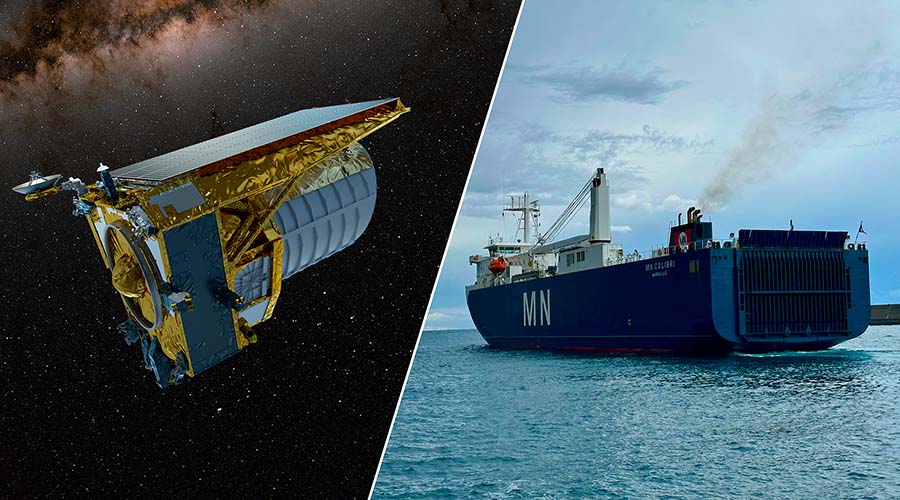 On 15 April, the European Space Agency's (ESA) Euclid satellite began its journey from the port of Savona. Next stop is the Cape Canaveral launch pad from which it will take off next July to position itself approx. 1.5 million kilometres from Earth, from where it will make a 3-D map of the location of billions of galaxies, in order to study dark matter and dark energy, which constitute approx. 96% of the contents of the universe, but whose nature we do not yet know. Italy, through the scientific and financial contribution of the Italian Space Agency (ASI), is playing an important role in Euclid, having participated from the outset in the design and construction of the mission's instruments and being responsible for coordinating the preliminary analysis of the huge amount of data on the ground (Science Ground Segment). The scientific institutes involved in instrument construction and mission scientific preparation activities are the National Institute of Astrophysics (INAF), INFN, the University of Bologna, the University of Milan, the University of Genoa, the University of Roma Tre, the University of Ferrara, the University of Trieste, the International School for Advanced Studies (SISSA) in Trieste, and the University Centre for Space Studies and Activities in Padua. Also of particular importance is the contribution of Italian industries in the sector, which have been directly engaged at all stages of Euclid's implementation. These include Thales Alenia Space, lead company for construction of the satellite and its service module, and responsible for its transfer to Cape Canaveral, OHB Italia of Milan, SAB Aerospace S.r.l. of Benevento and TEMIS S.r.l. of Milan and, for the Italian Science Data Center, ALTEC of Turin.
On 15 April, the European Space Agency's (ESA) Euclid satellite began its journey from the port of Savona. Next stop is the Cape Canaveral launch pad from which it will take off next July to position itself approx. 1.5 million kilometres from Earth, from where it will make a 3-D map of the location of billions of galaxies, in order to study dark matter and dark energy, which constitute approx. 96% of the contents of the universe, but whose nature we do not yet know. Italy, through the scientific and financial contribution of the Italian Space Agency (ASI), is playing an important role in Euclid, having participated from the outset in the design and construction of the mission's instruments and being responsible for coordinating the preliminary analysis of the huge amount of data on the ground (Science Ground Segment). The scientific institutes involved in instrument construction and mission scientific preparation activities are the National Institute of Astrophysics (INAF), INFN, the University of Bologna, the University of Milan, the University of Genoa, the University of Roma Tre, the University of Ferrara, the University of Trieste, the International School for Advanced Studies (SISSA) in Trieste, and the University Centre for Space Studies and Activities in Padua. Also of particular importance is the contribution of Italian industries in the sector, which have been directly engaged at all stages of Euclid's implementation. These include Thales Alenia Space, lead company for construction of the satellite and its service module, and responsible for its transfer to Cape Canaveral, OHB Italia of Milan, SAB Aerospace S.r.l. of Benevento and TEMIS S.r.l. of Milan and, for the Italian Science Data Center, ALTEC of Turin.
- NEWS INFN






